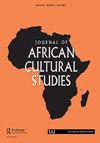殖民条件下的文明:1888-1907年斯瓦希里诗中的发展、差异和暴力
IF 0.9
2区 社会学
Q2 CULTURAL STUDIES
引用次数: 2
摘要
摘要对于全球发展史而言,德国殖民时期的斯瓦希里诗歌是宝贵的来源,因为它们有助于质疑将发展话语视为殖民意义的传播主义观点。本文分析了发展(maendeleo)和文明(ustarabu)的概念是如何在1888年至1907年间斯瓦希里作家的诗歌中出现的。除了将这些文本解读为支持或反对殖民地,它还表明了诗人对城市基础设施改善的重视。诗歌还受到沿海社会上层城市穆斯林阶层(waungwana)与下层非穆斯林内陆社会(washenzi)的自我形象的影响。几位诗人建议内陆社会应该受到约束,但与沿海斯瓦希里社会的差异通常不是从时间性或文明使命的角度来表达的。然而,由于德国的征服,诗人们不得不接受新的权力关系。虽然一些作者公开批评殖民暴力,但其他人也支持在基础设施和经济方面的殖民干预,但仍然对过去表示怀念。总之,这些诗歌构成了斯瓦希里语关于发展的话语中的一个过渡空间,表明这些不仅仅是殖民地的输入,而是从多个根源发展而来的。本文章由计算机程序翻译,如有差异,请以英文原文为准。
Civilisation under Colonial Conditions: Development, Difference and Violence in Swahili Poems, 1888–1907
ABSTRACT For a global history of development, Swahili poems from the German colonial period are valuable sources as they help to question the diffusionist view of development discourses as colonial import. This article analyses how concepts of development (maendeleo) and civilisation (ustaarabu) figured in poems written by Swahili authors between 1888 and 1907. Going beyond a reading of these texts as pro- or anti-colonial, it shows the importance poets attached to urban infrastructural improvement. Poems were also informed by the self-image of the superior, urban, Muslim strata of coastal society (waungwana) in contrast to inferior non-Muslim inland societies (washenzi). Several poets suggested that inland societies should be disciplined, yet differences to coastal Swahili society were usually not couched in terms of temporality nor in terms of a civilising mission. Poets had to come to terms, however, with new power relations as a result of German conquest. While some authors openly criticised colonial violence, others also embraced colonial interventions in infrastructural and economic aspects – but still expressed nostalgia for the past. In sum, the poems constitute a transitional space in Swahili discourses on development, showing that these were not merely colonial imports but grew from multiple roots.
求助全文
通过发布文献求助,成功后即可免费获取论文全文。
去求助
来源期刊

Journal of African Cultural Studies
Multiple-
CiteScore
1.70
自引率
10.00%
发文量
13
期刊介绍:
The Journal of African Cultural Studies publishes leading scholarship on African culture from inside and outside Africa, with a special commitment to Africa-based authors and to African languages. Our editorial policy encourages an interdisciplinary approach, involving humanities, including environmental humanities. The journal focuses on dimensions of African culture, performance arts, visual arts, music, cinema, the role of the media, the relationship between culture and power, as well as issues within such fields as popular culture in Africa, sociolinguistic topics of cultural interest, and culture and gender. We welcome in particular articles that show evidence of understanding life on the ground, and that demonstrate local knowledge and linguistic competence. We do not publish articles that offer mostly textual analyses of cultural products like novels and films, nor articles that are mostly historical or those based primarily on secondary (such as digital and library) sources. The journal has evolved from the journal African Languages and Cultures, founded in 1988 in the Department of the Languages and Cultures of Africa at the School of Oriental and African Studies, London. From 2019, it is published in association with the International African Institute, London. Journal of African Cultural Studies publishes original research articles. The journal also publishes an occasional Contemporary Conversations section, in which authors respond to current issues. The section has included reviews, interviews and invited response or position papers. We welcome proposals for future Contemporary Conversations themes.
 求助内容:
求助内容: 应助结果提醒方式:
应助结果提醒方式:


